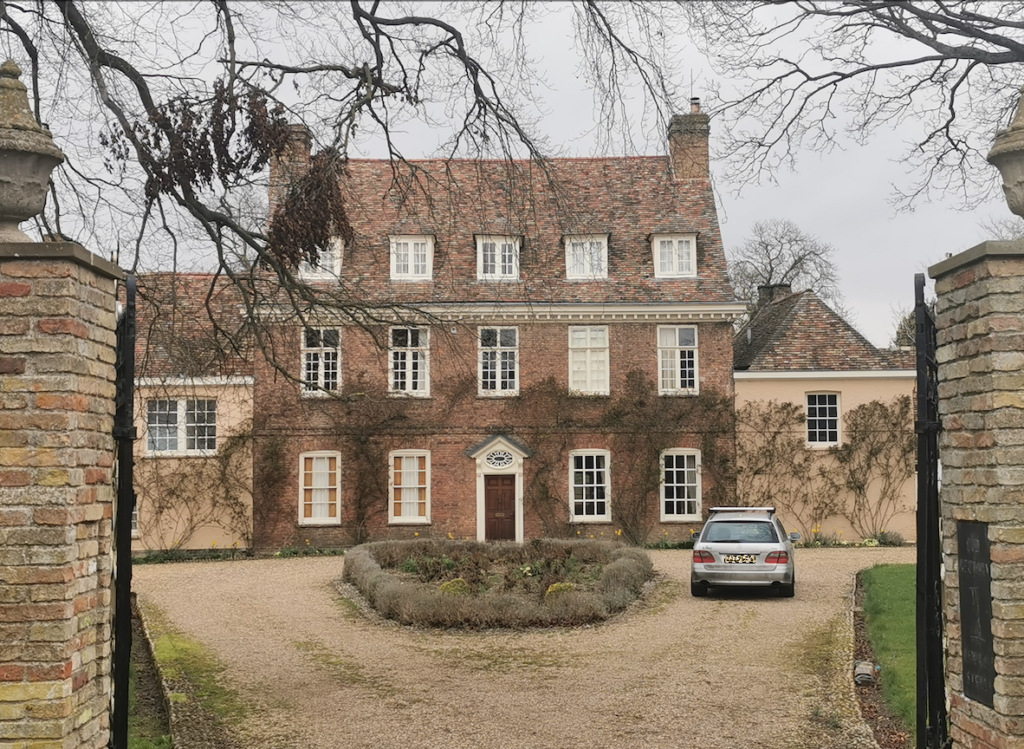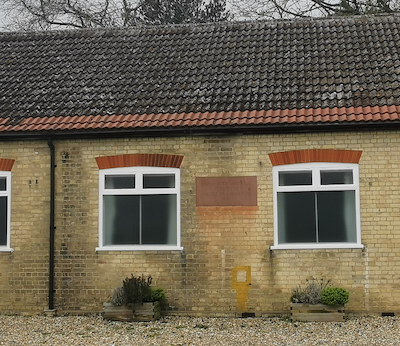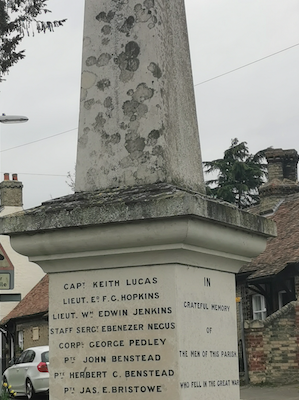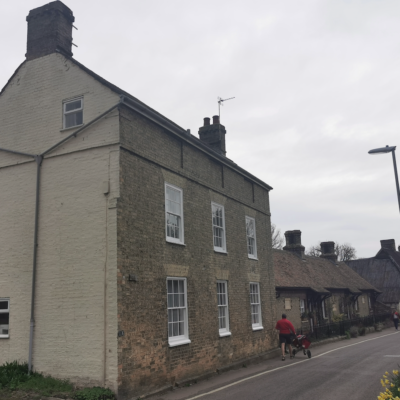Search by topic
- archaeology
- Building of Local Interest
- charity
- church
- crime
- dressmaker
- fire
- Great Eastern Railway
- Listed building
- Mapping Relief
- medieval
- oral history
- poverty
- Public House
- Rattee & Kett
- Religious House
- Roman
- scholar
- school
- Then and Now
- tudor
- women
- work
- world war one
- world war two
Search by text
 1 Church Street, Fen Ditton
1 Church Street, Fen DittonThe Old Rectory, 1 Church Street, Fen Ditton
History of the Vicarage, Fen Ditton
Listed building:
House, formerly the rectory. C16 and C17 with early C18 rebuilding and late C19 additions. Timber framed, C18 red brick and C19 gault brick painted.
The case of defamation brought by Martha Brown, wife of Rev William Brown James vicar of Fen Ditton, against Edward Smith, former sexton of the parish, was brought in April 1849. It was reported not only by the press but also by Josiah Chater in his diary. The case was extremely unusual and gained a lot of local interest, not least because of the strange find at the rectory in 1847.
Cambridge Independent Press 20/2/1847
Suspicious Occurrence.—On Thursday, the 28th ult., the body of a female infant, in so mutilated a condition as almost to defy surgical examination, was found at Fen Ditton, in a pond situated in a close behind the rectory. An inquest was held on Tuesday before Mr. G. J. Twiss and a verdict of “found dead in a mutilated state” returned. A hand-bill has been circulated by Mr. Muggleton, constable, of Fen Ditton, offering a reward of ten pounds on the conviction of any one concerned in depositing or mutilating the body.
Cambridge Independent Press 28/4/1849
ARCHES’ COURT.—TUESDAY, APRIL 24. (Before Sir H J Fust) James v Smith.
This was a cause of defamation, promoted Mrs. Martha James, wife of the Rev. William Brown James, Fen Ditton, against Edward Smith, of that parish, for having, in the month of April and May, I848, in a reproachful and insidious manner, charged Mrs. James with the crime of adultery. The writ was brought to this court by letters of request from the Vicar-General of the Bishop of Ely; and no appearance having been given for the defendant, the proceedings were conducted in person.
Dr Bayford submitted, that the two witnesses examined in the cause distinctly proved the averments in the libel, and therefore prayed the Court to pronounce the usual sentence.
The learned judge said that he had no difficulty whatever pronouncing that the defamatory words had been used: consequently the usual penance must performed in the parish church of Fen Ditton on Sunday, the 6th of May, and Mr. Smith must be condemned in costs.
Cambridge Independent Press 5/5/1849
We stated last week that in the Arches’ Court, Edward Smith, of Fen Ditton, was condemned to perform penance in the parish church, at that place, on the 6th of May, for defaming the character of Mrs. Martha James, the wife of the rector. The fact that a person is condemned to “perform” so fantastic a trick as standing in a parish church in a white sheet will assuredly draw a good audience. We know that the word ‘congregation’ is generally applied to a church assemblage, and audience to the theatre; but as Ditton church is to be made the arena of a piece of contemptible tom-foolery we have varied the word. A village church to us, and we presume, to most people, is a beautiful sight; the one at Ditton, ornamented by towering trees, surrounded by broad and fertile fields, the Cam meandering by, all conspire to superinduce a feeling of respect and admiration for an edifice reared as God’s temple, for simple minded villagers to offer up their aspirations to their Maker for his great mercies to them and all men; but to-morrow the interior of that church is be converted into an exhibition room, where a scene is to be enacted more attractive and more laughable than will be seen at the coming fair; the church will be full — no doubt; but who will regard the parson? whose attention will be rivetted upon our beautiful liturgy? Will not the service be a mere lip service, every eye being turned upon the Ditton gardener, dressed as the ghost in Hamlet; and who, to make the matter more grotesque if possible, if he does go, has promised to black his face, to display the whiteness of the sheet to better advantage. And as the church will be full of the curious, of all grades, so will afterwards be the public houses; and the church exhibition will be the theme of many a rude jest, and many a gibe over heavy wet and fumes of tobacco. And after all, how much fairer will be the character of Mistress Martha James, for all this mummery.
Cambridge Independent Press 12/5/1849
DOING PENANCE IN DITTON CHURCH. Amongst the many ridiculous laws which yet disgrace the statute-book, and which the boasted spirit of the age has not swept away, is that of sentencing a person to do penance in a church. It is an ecclesiastical law, and probably that may account for it being one the mummeries yet tolerated; for a cry of reform in the church is sure to elicit the well-worn cry of “The church in danger” from the bigotted. There was a time when the doing of penance was no doubt looked upon with awe, but as we grow older we grow wiser, and now it is properly treated with unmitigated contempt, an insult to common sense and decency. Happily, doing penance in church is of rare occurrence, and it was with laughter and astonishment that the inhabitants Cambridge must have read that such a scene was to be enacted in the church of the unpretending village of Ditton, about two miles from hence: the sentence having been gravely passed in the Arches Court on Tuesday, the 24th ult., upon one Edward Smith, a gardener and fiddler, convicted of having, about twelve months since, slandered Mrs. Martha James, the wife of the Rev. William Brown rector of Fen Ditton. The writ was brought into the Arches court by request from the Vicar-General of the Bishop of Ely; and no appearance being given for the defendant, the proceedings were conducted ‘in poenam’. It is with considerable pain that we advert to the alleged slander, but make our report complete we are necessarily obliged to do so. About two years ago, when Edward Smith was work in the rectory garden, as undergardener, he chanced to dig up the head and part of the shoulder of a child. This discovery naturally produced no little consternation in the man’s mind, and caused him to chatter before his pot companions. The remainder of body of the infant was eventually discovered in ditch somewhere the vicinity of the garden, and we believe an inquest was held upon it; but fancied at the time, and, indeed, so expressed our opinion, that the matter did not undergo a very searching investigation. It was in consequence of the observations made Smith relative to the finding of these remains that he was cited in the Arches Court. Sunday last was the day fixed for the performance of the penance, and for several days previous it was the all-absorbing topic of conversation. Smith was at Cambridge about every day during the week, and was “lionised,” as was thought a lucky thing to see him, and to have spoken to him on the subject was the boast of many a wondering clown. To some Smith stated that he would not conform to the edict of the Court; to others, he said he would. He even went so far as to say that he intended to black his face, to give himself a more peculiar appearance when attired in his sheet, all ghastly white. At length the anxiously looked for day arrived—Sunday morning came— and fortunately, or unfortunately, (just as people like) the weather, though cold, was fine, which gave the curious a better opportunity of indulging their curiosity. We did expect to see a great many people at Ditton; we were prepared to see something uncommon; but we never supposed that so vast a concourse would assemble on the occasion, or that so disgusting and brutal an exhibition awaited us. From nine o’clock till eleven, the road from Cambridge, by the Paper Mills, was thronged with as motley groups as can well be imagined. Carriages, flies, four-wheels, dog-carts, gigs, and more humble vehicles, were dashing along for Ditton in gallant pace; the pedestrians comprised students of the University, reputable tradesmen, artisans, bargees, navvies, coal-heavers, shoeless vagabonds, and limping beggars. There was a fine display of the fair sex, the most of whom we hope and believe were denizens of Barnwell; and never, we opine, was that same place so free of rogues and the frail sisterhood. Hundreds made their way to the village by the fields, as the pleasantest walk. By ten o’clock the churchyard began to display a lively appearance, and it soon became tolerably full. Still, as it yet wanted an hour to the commencement of prayers, it was felt be essential to while away the time. Boys played on the graves, and jumped over the stones, after the fashion of leap-frog; the more sedate amused themselves, and let us hope learnt a moral lesson, by reading the epitaphs upon those stern monitors to humanity, the gravestones, which tell of the virtues and faith of those who quietly repose in the narrow confines of mortality’s last resting-place; some contented themselves with watching the fresh arrivals that were continually pouring in the church-yard, exchanging a nod of recognition to an acquaintance, and each smiling in sympathy at the cause of their meeting in Ditton. The entrance gates to the church now became surrounded—boys shook the doors, and whistled and swore, and bellowed, and played those sorts of practical jokes that obtain at the doors of a theatre when the impatient crowd are clamouring for admittance. At length that worthy functionary—the Peter of Ditton church—was seen approaching with a ponderous key protruding from a side-pocket. “Hooray,” cried a dozen boys, “here he comes ; make way there. Come on, old fellow, we want to get in.” Then the crowd became more compressed, and pushing, squeezing, squeaking, squealing, and swearing commenced. “Clear the road,” cried he of the key, make way for the Sunday-school children!” But people pressed the closer, and evidently thought little or nothing Sunday-school children. After many an ineffectual effort to persuade the crowd to give way, the worthy functionary marshalled his juvenile troop to another door and a portion of the crowd was quickly at his heels, and he walked round and round, dodging from door to door, the picture of quiet despair. At length a very narrow door was opened, hardly wide enough to admit one person; and great was the crowding, shouting, and squeezing thereat. Some unfortunate child was half crushed, and screamed most lustily; and the angry voices of females blended unharmoniously with the rugged clamour of reckless men. The pews were speedily filled, and then the broad gates were opened on the opposite, or Cambridge side, and wonderful it was to see the human stream pour into the aisle of the church, which soon became crammed ; so that it was difficult either to stand or sit. The screen was covered by men of the poorer order, who sat astride; the capitals of the pillars had each its human occupant, the window nooks were taken possession of, and how people managed to climb up, except jumping from each other’s heads is most mysterious. There could not be fewer than 1,200 or 1,400 people in the church, and hundreds were yet outside unable to get in; reminding one of an epitaph in Ely churchyard,
“Here I am without the door.
The church is full, ’twill hold no more.”
But the windows outside were dotted with human heads, and ever and anon during the service a nose was pushed through a pane of glass, either by accident or as a piece of innocent recreation, by some one struggling for a peep.
At eleven o’clock the Rev. Mr. Small, of Emmanuel College, who had undertaken to perform the service for the Rector, pushed his way up to the reading-desk, followed by the Rector himself and his wife, who at once became the “observed of all observers;” people pushed and crowded and climbed on the top of the pews to catch a glimpse at the fair and portly lady, who had vindicated her honour in a court of justice against the allegations of an unthinking, stupid fiddler. Mr. and Mrs. James sat in a pew a short distance from the pulpit. No sooner had Mr. Small commenced the prayers, than the responses were made several present in a tone and in such a manner as at once convinced us that mockery was intended and which must grieve every well regulated mind. As the service proceeded, the mob in possession of the church—for deserves no other name—began to wax impatient. ” Speak up, old feller,” roared a stentor, addressing the clergyman. ” I should like drop of ale,” shouted one with a flannel jacket, which no doubt was true, as the atmosphere began to be exceedingly close; and many such disgusting interruptions and observations were made. At the conclusion of the Litany it was expected that the “Penitent” was to appear in his sheet, but that not being the case, great impatience was manifested, and a cry of “Where’s Smith?” was set up. Several being weary before the Litany terminated, lighted short pipes, and the air soon became impregnated with the fumes of tobacco. So crammed was the aisle that Mr. Small could not, nor did he attempt, perform the communion service in the proper place, but kept at his reading desk; and it should be observed that throughout the service he read in a firm and impressive manner, elevating his voice and exerting himself that he might heard by his numerous congregation! ‘ The prayers having been performed, Mr. Small threw off his surplice and mounted the pulpit, to the manifest annoyance of the assemblage, who could not restrain their impatience—but coughed, shouted, and shuffled with their feet, and beat the seats with sticks: these tricks had now become the disorder of the da ; still the rev. gentleman with many a supplicating look, and casting anxious glances around him, proceeded to deliver his text, which was from the 7th chapter of Matthew v. 1, “Judge not, lest ye be judged.” The preacher then proceeded to descant on the great wickedness of men, actuated by malice or revenge, who defamed the characters of their fellow-creatures without cause. After proceeding in this strain for a short time, the cry arose, ” He comes! He is here!” At this moment, Smith was observed struggling through the crowd towards the pulpit, and then came a scene no pen can fairly paint, no tongue describe. A shout of applause, in compliment to Smith, burst upon our astounded ears, followed by dismal shouts of execration and groans for the rector and his wife, sickening to reflect upon. The house of the living God, that structure raised to honour and glory, was now converted into a place for blasphemy, and a display of vindictive feeling and unhallowed exultation that would have cast a slur upon the savages of New Zealand in their wildest state. The mob pressed madly on to get near Smith, who, by the bye, had no white sheet on; pews were broken down, women screamed, and men shouted, inebriate with rage; wood crashed, hassocks were whirled high in the air, and then fell, crushing a bonnet, or falling a head. Mr. Small now made anxious gesticulations to Smith to proceed; Smith’s lips moved, but great was the uproar that not a word could be heard; he waved his hand to the people that they might be quiet and hear him, but no sooner did he produce his written recantation than one simultaneous shout again arose, and the confusion now became most painful and horrible. Mr. Small left his pulpit, and came down to speak to Smith, and then arose the cry, ‘Get into the pulpit, Smith; get into the pulpit.” But in a minute the pulpit and reading-desk were full of people. Smith certainly attempted to read, but not a word was heard, and the following is a copy of the recantation he held in his hand, and which is supposed to have read; but no man, we dare say, would be bold enough to say he ever heard one word: –
Whereas I, Edward Smith, have uttered and spoken certain scandalous and opprobrious words against Martha James, wife of the Reverend William Browne James, Clerk, Rector of the parish Fen Ditton, in the county of Cambridge, to the great offence of Almighty God, the scandal of the Christian religion, and the injury and reproach of my neighbour’s credit and reputation, calling her a -, and using other defamatory words of and against her. I, therefore, before God and you, humbly confess and acknowledge such my offence, and am heartily sorry for the same, and do ask forgiveness, and promise hereafter never to offend her in like manner again, God assisting me.”
After a further pantomimic display between Mr. Small and Smith, the mob seized the latter, and placing him on their shoulders, bore him out of the church with a yell of triumph.
Smith left by one door anil the rector and his wife another, each had their followers. The “Penitent” was hailed with loud applause, as though had done something meritorious to acquire popularity, while hisses and groans followed the steps of Mr. and Mrs. Jautes, as though they, and not Smith, were the slanderers. Smith being taken from the men’s shoulders, now gave his arm to his wife, whose broad smiling and flushed face seemed lit up to a pitch of the highest gratification, at what she evidently conceived to be her husband’s victory. Villagers pressed forward and shook him cordially by the hand, saying, ” Brave old feller, you’re a stunner!” A large party now assembled at the Plough, where ale and tobacco were called for. Smith and his wife went on the green, and he was called on to address them. He seemed exceedingly excited and exclaimed, “I am sorry I cannot ask you all to dinner, my friends; but you know I am only a poor man.” He then gave a detail of his finding the child’s head when at work the rectory, and stated that Mrs. James had accused him of bringing this body from the churchyard for a scandalous purpose, and he had been out of work ever since. He added, that if the rector had “put him” into a minor court he would have fought him; he fancied, however, the rector was now sick of meddling with the fiddler. Smith and his wife shortly afterwards retired, he expressing hope that there would be no disturbance; but a vast number stopped at the inn, and drank and smoked their hearts’ content.
But to revert to the former part of the narrative. We stated that the church was crowded and that hundreds could not find room. It was necessary therefore for these to find some amusement, so dogs were set to fight, boys were urged to quarrel, and men fought pitched battles. A large number, tired of such sights, repaired to the rectory garden, where a wag placed himself at the gate, saying, with an affable smile upon his broad, good-humoured countenance, “Walk in, gentlemen; take a look at the grounds ; you are quite welcome.” Then, as the “gentlemen”‘ were not very particular as to whereabout they walked, a fiery-faced female domestic from upper window shrieked “Be off; oh, how dare you! well, I never! what will the Rector say ! go away, will you!” Then a dustman in Sunday gear, called out, his reverence got no beer and bakker to ax his friends to have—he ought to have tapped a barrel on purpose.” “In course he ought,” cried a begrimed faced chummey; ” here’s a scurvy way to treat one’s visitors.” These and such like observations whiled away the time till suddenly the church bells began to ring. This was thought to denote the termination of the service ; but the tinckling proceeded from a different cause. As soon as Smith entered the church, some bargees sitting on the skreen seized the bell-ropes and pulled away right merrily. It is said that a broom was hurled across the church towards the minister, and that a hassock struck him. It might be so; we did not see it, although we were within a few yards of the pulpit; but such was the confusion, so great the violence that prevailed that one needed the eyes of Argus to see all that was going on.
FenDitton is a village of beggars, from the silvery- haired man down the lisping child. One cannot pass through, or near, but is sure to be pestered for a copper for tobacco by the one, or “please give me a halfpenny for opening the gate,” by the other. This then of course was an occasion not to be lost sight of. The beggars, or “askers,” as they are fashionably called, forgot their own individual merits, and raised their cry of sympathy for “poor Smith:” the money-boxes, and large ladles, so in requisition on Plough Monday, were brought out, and “please remember poor Smith” was the vigorous cry of the supplicants. But if anything were given, and which we hope was not the case, we much question if “poor Smith” were any the better for it.
It is said that the Churchwardens, on the Sunday morning, anticipating the coming storm, waited upon the rector’s wife, and to prevent confusion in church, urged her to forego the public demonstration of penitence, and at all events not to be present herself, for which there was absolute necessity ; but it difficult to overcome the obstinacy of an angry woman; she would listen to no such terms. Let us hope that she now repents her decision, and regrets being the occasion of one of the most disgusting exhibitions ever enacted within the walls of a sacred edifice. Smith may have, in his drunken chatterings, given cause for much annoyance; but the rector’s wife, strong in her virtue, and glorious in purity and innocence, might well have afforded to treat with supreme scorn the scandal raised by a mere gossipping village fiddler, to gratify the ears of men as ignorant, and probably as reckless, as himself!
We understand the man Smith was in the service of two former rectors, gardener and parish clerk, and was continued by Mr. James—circumstances which may be considered to be very favourable to him.
Josiah Chater’s account in his diary records that he was not present in the morning but went over with his brother and friends to see what sort of wreck the church had been left as. he must have spoken to several eye witnesses because his account of the chaos matches the newspaper story. (Victorian Cambridge, Edin Porter p37-8)
Cambridge Independent Press 26/5/1849
Fen Ditton — Penance.— The revival of ecclesiastical punishment at the church here will render of interest the following document, the original of which is in the possession W. A. Nicholson. Esq., of Lincoln: —”Sexto die mensae Januarii, anno 1593.—Parte of pennance injoyned unto Agnes Black, of Fen Ditton. The saied penitent shall uppon Sunday, bcinge the eighte daie of February next cominge, clothed in a white sheete downe to the grounde and white wande in her hande, resorte unto the parish churche-porche of Fen Ditton aforesaied, and there shall stande from the seconde peele to morninge prayers untill the readinge of the seconde lesson, desiringe the people that passe into the church to praie to God for her, and forgive her; at which time the minister there shall come down to this penitent and fetch her into the church, readinge the psalm of miserere in Englishe, and place her in the middle alley a-parte from all other people, where she shall penitently kneel untill the readinge of the ten commandments, at which time the minister there shall come to this penitent and cause her to saie and confesse followethe. viz.— ‘Good people, I acknowledge and confer that I have offended Almighty God, and by my evill example you all, for that I have broken his divine laws and commandments, in committing the most shameful and abominable sinne of adultrie or fornication, for which I am most hartily sorry, and I ask God and you most hartily forgiveness for the same, promisinge by Gode’s helpe never to offend hereafter in the like againe.’ — And at the end of this confession the first daie, the minister to rede the homely against adultrie or fornication and the third daie to rede the homely repentance, the penitent standing by all the while; and in like manner and form in every point and condition above is prescribed, she shall doe two other Sundaies or holy daies, next ensuinge after the first. And if the penitent doing this uppon all the saied three several Sundays or holy daies, she shall under the handes of the minister and churchwardens there personalie certifie togeather with those present to xxvii daie of February at Grete Maries church in Cambridge, and then and there receave such further order herein as shall be appointed.—Bennet Thorowgood.” — This penitent hath done hir pennance three several Sundaies or holy daies in the parish church of Fen Ditton. according to the premises. Ita est ut testatur. Thomas Godred, Cur. ibid church.—By me, Edward Warden Brady.
Cambridge Independent Press. 22/9/1849:
THE FEN DITTON CASE. To the Editor.— Sir, —The public are much indebted you for the statement you last week of the case of Smith, now confined in prison for the costs of the case that condemned him to do penance on a Sunday, before the congregation assembled in the parish church, and in a peculiar dress. Really, Mr. Editor, one has to ask himself (recently as this has occurred}, it possible in this age, in enlightened Britain, and in the bosom of that Church handed down to us from Apostolic times, that such a monstrous affair as this could take place ?
But now the man has done penance, and the character of the lady whom he slandered is thoroughly vindicated, he is condemned to durance vile for £40, to pay the costs, and consequently deprived of all means of obtaining it. Whatever the doing penance might have been to the good people of Fen Ditton, this no trifling matter with him; and now the case is fully known, surely Englishmen will never let him remain there a prisoner any longer.
I send you a Post-office order for a sovereign, which I beg you will apply his case, the result of a shilling subscription among a few friends; and sincerely hope before many days you will receive the remainder, in shillings, for this ought to be the common cause of every man in Britain. —l am. Sir, your obliged aud humble servant, G. BRIGHTY. Great Raveley, Sept. 1519. [We shall take care that Mr. Brighty’s subscription, and any other that may be forwarded to us, are properly applied.—Ed.]
Cambridge Independent Press 15/12/1849
The Fen Ditton Case
Sir, This case which has excited so much public feeling, is at length decided – Smith has done penance – suffered imprisonment – will be discharged on Thursday – and the lady’s honour (which he called into question) remains untarnished. Fen Ditton will occupy a conspicuous place in history, like ‘Warboys and the witches’ it will point to in future ages, as the last place where a man performed penance, and Smith has certainly perpetuated his name to posterity.
I send you a cheque for £7 10s subscribed by numerous friends, who like me, felt an interest in this peculiar case which I beg may be applied to his necessities.
I remain Sir yours obediently and faithfully
G Brighty, Great Raveley Dec 6.1848
[We have received Mr Brighty’s cheque which with £1 2s 6d in hand, has been duly paid over. – Ed]
1851
William B James, 50, rector of Fen Ditton, b Essex
Martha, 29, b Harston
William B, 2, b Fen Ditton
John, 1, b Fen Ditton
Elizabeth Rooke, 20, servant, b Middlesex
Mary Rooke, 16, servant, b Surrey
Frances Webb, 14, servant, b Fen Ditton
Ann Peters, 21, servant, b Royston
Frances Webb married in 1855 and emigrated to Australia [email from TZ 2022]
……….
Contribute
Do you have any information about the people or places in this article? If so, then please let us know using the Contact page or by emailing capturingcambridge@
License
This work is licensed under CC BY-NC-SA 4.0












